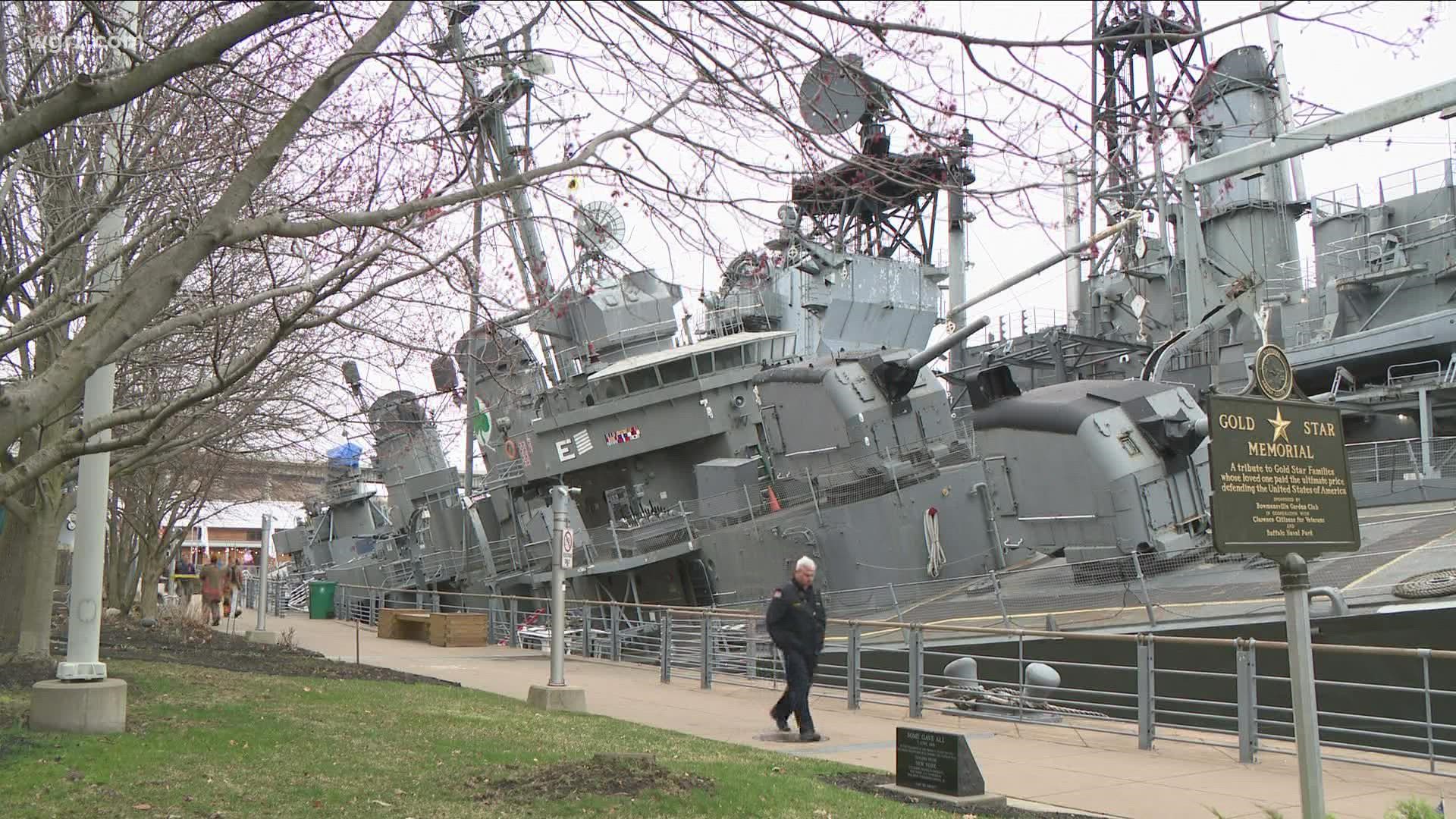BUFFALO, N.Y. — Whenever they figure out repairs for the USS The Sullivans, there might be some thought to the future to better protect these ships, including the less fragile and bigger Little Rock. But it will be expensive.
They survived war on the high seas but Mother Nature can really hurt them. A smaller warship like the USS The Sullivans with its three-eighths of an inch thin hull can be affected not just by the river ice, but more-so wind-whipped waves off Lake Erie.
We spoke today with some experts with the Historic Naval Ships Association for their perspectives.
Tim NeSmith is the ship superintendent with the USS Kidd Memorial in Baton Rouge, Louisiana. He used this analogy to explain what can happen with a ship like USS The Sullivans. "Think of these ships as your grandmother because they're all about to turn 80 years old, the ones that were built before World War II. So folks who are up in age, their skin begins to get thin and the ship's hulls overtime begin to thin out. Particularly at what we call the latt line where the water - the water line is. You've got all that movement, the winds splashing the waves against it. That area begins to thin out".
With Buffalo's destroyer they are using an adhesive epoxy to seal hull cracks and leaks but it's definitely not a long term fix according to NeSmith and other experts. He says they may also use metal patches but that may require actually moving and towing the ship to put it a drydock, which may not be possible with the ship's condition.
The USS Kidd, a sister ship to USS The Sullivans as a World War II Fletcher class destroyer, is actually better protected in a cradle like dry dock. It's located in the Mississippi River in Baton Rouge, Louisiana and adjustable because the river there goes up and down by 40 feet.
He says the maintenance factor is crucial and difficult with these older ships. "In World War II, the Kidd and Sullivans would have had a crew of 330 people aboard at all times doing maintenance every day. Even if you were a radarman or a cook in your off time they're gonna have you chipping, scraping, painting. So that was a ready made workforce that took care of them all the time. Most museum ships today, if they had a tenth of that they're lucky."
Another in water protection option is a cofferdam used around museum battleships like the North Carolina - with water pumped in and out of a structure surrounding a ship which in this case is much larger than the Sullivans. It was built for $8 million in 2016 by the state of North Carolina.
A similar structure was built in Mobile, Alabama in the 1990s for the battlewagon at the USS Alabama Memorial Park.
The executive director there is Janet Cobb, a retired US Army Major General who says they also made her an "Honorary Admiral." She spoke about the USS Alabama now moored in that cofferdam. "Her keel is actually in about 22 or 24 feet of port sand and mud. A cofferdam was built years ago - I think in the early 1990s. And we also have cathodic protection that helps us try to monitor and prevent a lot of corrosion that eventually does always occur with anything that's in the water."
Cobb says the Historic Naval Ship Association is already offering advice and help to Buffalo. "We do have a lot of resident expertise. Some are retired military. Some are naval engineers. Whether they served or not they've got expertise in handling these ships on the maintenance side and we'll do everything that we can."
Cobb says that association will be reaching out to the Buffalo Naval and Military Park in a more formalized way next week but there have already been some initial conversations.
So would any of these protective structure ideas work in Buffalo? Paul Marzello of the Buffalo and Erie County Naval and Military Park told 2 on Your Side Photojournalist Joseph O'Rourke that there has been some thought about the future for the ships. Obviously the repair is the major task right now. But when asked he said, "A cofferdam is one of the long term solutions that we have looked at. It's a far more expensive option. We are going to look at that and some other options that we have been talking about. Can it be done? Yes. All of it requires money and resources."
We also checked with some government agencies which may have requirements with any construction of "in-water" structures in the vicinity of Lake Erie. The US Coast Guard told 2 On Your Side they would not have any major restrictions provided environmental rules were followed for such structures in the vicinity of the Great Lakes.
The New York State Department of Environmental Conservation noted that there would probably be a permit process and they were providing assistance at this point.
We also reached out to The US Army Corps of Engineers, which is involved with dredging of ship channels and construction of breakwalls. They have not responded so far.

